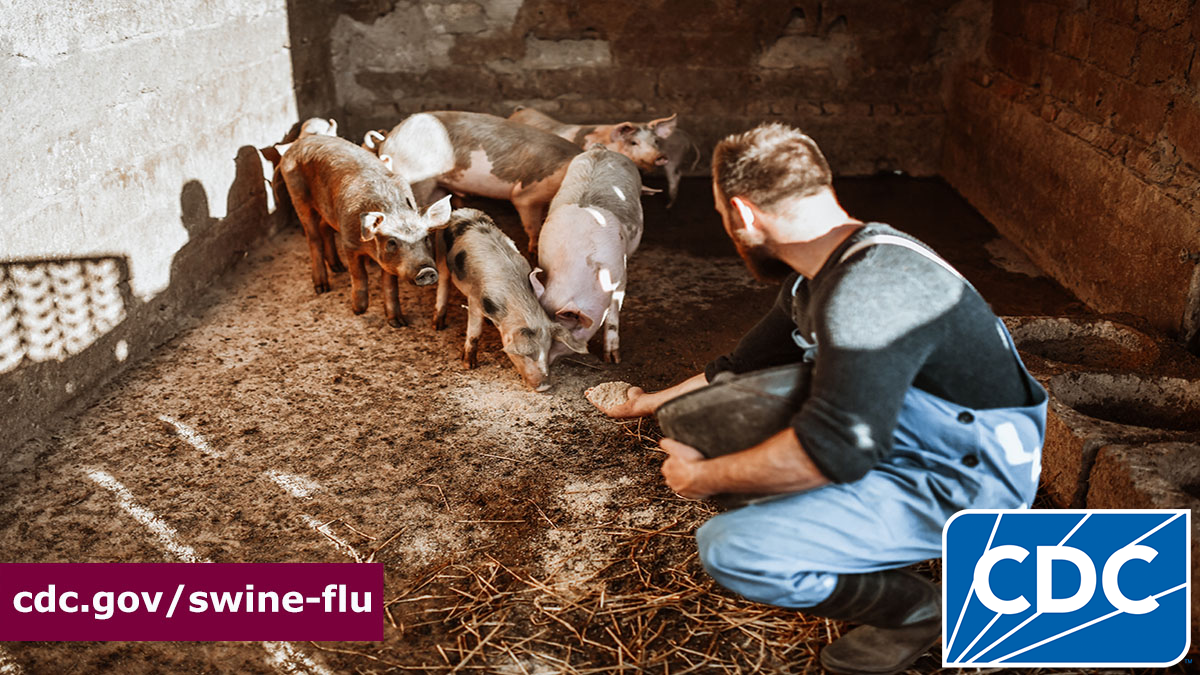About
- Influenza A viruses circulate among many different animals. Influenza A viruses that circulate among pigs are called swine influenza A viruses.
- These viruses are different from influenza A viruses that spread among people and different from avian influenza A viruses.
- While rare, influenza A viruses--including seasonal human A viruses and swine influenza A viruses--can spread from pigs to people and from people to pigs. When an influenza A virus that normally infects pigs is found in people, it is called a 'variant influenza' virus infection.
- When people get variant flu, it's usually after contact with infected pigs or surfaces or environments contaminated with swine influenza A virus, such as a swine barn. These infections have occurred in different settings, including agricultural fairs.
- The Centers for Disease Control and Prevention (CDC) recommends people take the following actions to help prevent the spread of influenza A viruses between certain animals (including pigs) and people. While the content of this page focuses on pigs, similar precautions are recommended around poultry and dairy cows, which can carry and spread different influenza viruses called avian influenza A viruses.

Take Preventive Actions
- People at increased risk for severe influenza complications should avoid exposure to pigs.
- Don't eat, drink or put anything in your mouth in areas with pigs.
- Don't take toys, pacifiers, cups, baby bottles, strollers, or similar items into areas with pigs.
- Wash your hands with soap and running water before and after exposure to pigs outside or inside a swine barn. If soap and water are not available, use an alcohol-based hand rub.
- To further reduce the risk of infection, avoid or minimize contact with pigs in the pig barns and show arenas.
- Where possible, avoid direct contact with pigs that are known or suspected to be sick. If you must come in contact with pigs that may be ill, then wear personal protective equipment (PPE). This includes protective clothing, gloves, and a well-fitting mask that covers your mouth and nose. Parents and caregivers should review considerations for specific groups of people when selecting a respirator or mask for children.
- If you have a pig, watch for signs of illness (like loss of appetite, fever, tiredness, eye redness, discomfort, cough, or runny nose)
- If you suspect your pig is sick, call a veterinarian.
- If sick pigs are in an exhibition area, remove them right away.
- If possible, avoid close contact with sick pigs.
- Avoid contact with pigs if you have flu symptoms. Wait to have contact with pigs until 7 days after your illness started or until you have been without fever for 24 hours without the use of fever-reducing medications, whichever is longer. If you must have contact with pigs while you are sick, take the preventive actions listed above.
Like everyone else, people who care for pigs should get a seasonal flu vaccine every flu season. Although a seasonal flu vaccine probably will not protect people against infection with variant influenza A viruses (because swine influenza A viruses are substantially different from seasonal influenza A viruses that infect people), vaccination is important to reduce the risk of spreading human seasonal influenza A viruses to other people and to pigs. Seasonal flu vaccination might also decrease the potential for people or pigs to become infected with human influenza A viruses and influenza A viruses from pigs at the same time.
People at Higher Risk
- Anyone who is at higher risk of serious flu complications who plans to attend an event or setting where pigs will be present, such as an agricultural fair, should avoid pigs and swine barns.
- If people at higher risk cannot avoid exposure to pigs, they should wear a well-fitting mask that covers the nose and mouth (e.g., an N95 respirator or KN95 respirator if available, or if not available, a surgical mask) to reduce the risk of exposure to influenza viruses from pigs.
- People at higher risk of serious flu complications who develop flu symptoms should call a health care provider. Tell them about your risk factor and any exposure to pigs or swine barns you've had recently. Human seasonal flu vaccines will not protect against influenza A viruses that commonly spread in pigs, but prescription influenza antiviral drugs can treat infections with these viruses in people when treatment is started shortly after symptoms begin.
Recommendations for Fair Exhibitors
CDC guidance for people exhibiting animals including pigs, poultry, waterfowl, and cattle is available at Key Facts for People Exhibiting Pigs at Fairs.
- CDC Recommendations for People at Higher Risk of Serious Flu Complications
- CDC Recommendations for People Not at Higher Risk of Serious Flu Complications
- Considerations and Information for Fair Exhibitors to Help Prevent Influenza
- Considerations and Information for Fair Organizers to Help Prevent Influenza
